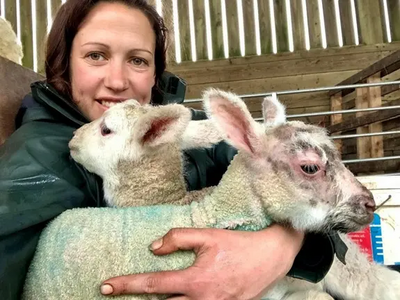Devon farmers slam trade deal with Australia
'Put Britain first', Boris Johnson told

Cheryl Cottle-Hunkin with two of her lambs - scenes like this may be a thing of the past if the Prime Minister gives in over the Australian trade deal
As the Government seeks to conclude a trade deal with Australia in record time, Devon farmers have joined in widespread condemnation of reports that the agreement will allow unlimited and tariff-free imports of meat which will undercut British producers, calling it a 'betrayal of British farming.'
Although the Government has previously committed to safeguarding environmental protection, animal welfare, and food standards in all its trade negotiations, there are reports that the UK is now under pressure in its talks with Australia and New Zealand to make damaging concessions in order to get the deal done. The National Farmers Union has put out a strong statement calling the government 'irresponsible' for proposals which will undermine British food production. The UK Farming Round Table has also heavily criticised the proposed deals, drawing attention to the climate implications of importing food from far-off countries with lower standards of environmental protection.
Local farmers have urged the Prime Minister to 'wave the Union Jack' and 'back British sheep farmers', saying that traditional family farms like those in North Devon and Torridge will be put at risk from unfair competition if the supermarkets are flooded with cheap meat imported from the other side of the world. Local farmer and butcher, Ray Auvray, commented:
'The Tories are willing to sacrifice the livelihoods of family farms in areas like Torridge and North Devon to land a trade deal with Australia that makes no sense. When we are trying to improve animal health and welfare standards in the United Kingdom, it is crazy to import meat that is produced to different and lower standards in countries like Australia, the USA, Argentina, and Brazil. If we want to reduce the carbon footprint of our food, we should be looking to source locally from our farms here in North Devon, not shipping food around the world! Michael Gove talked about "greener farms" after Brexit. Deals like the one being proposed will increase the carbon footprint of our food and destroy traditional, extensive farms in the UK, leaving only industrialised agri-businesses to compete. This is a betrayal of British farming and profoundly damaging to the environment.'
Cheryl Cottle-Hunkin, Torridge District Councillor and fifth generation sheep farmer in Petrockstowe, also pointed to the environmental impact of importing food we are well able to produce in this country, saying:
'Johnson must support British farmers and must not allow a zero-tariff, zero-quota trade deal with Australia. Not only would this be a massive blow for British agriculture but opening our borders to unrestricted imports from the other side of the world flies in the face of the climate emergency we currently face. An influx of Australian imports would be a threat to our high quality, high welfare British produce, particularly for our family farms here in Devon where we take such pride in our livestock. Even more worryingly, it would set a precedent for future trade deals with countries such as the US, Canada, and New Zealand, who would be seeking the same terms.'
Stephen Middleton, a fourth generation Devon beef and sheep farmer, also warned of the danger to local production, saying that British farmers are already able to supply the home market with all the quality lamb it needs:
'We are all used to seeing sheep and their lambs grazing in the fields in our locality. British lamb is locally produced, locally processed, and locally consumed. It has a low carbon footprint. We do not need any more Australian sheep meat in our marketplace, with the high carbon footprint of it being shipped halfway around the world. We have a climate emergency on our hands. Come on Boris, wave the Union Jack, back British sheep farmers!'
The UK Farming Round Table has accused the Government of overlooking rural communities in its 'levelling up' agenda, putting areas like North Devon and Torridge at risk for the benefit of foreign businesses:
'Trade deals that threaten the future viability of farming strike at the heart of our communities…Farming livelihoods, should not be put at the risk for the benefit of foreign businesses.'
Local farmers have added their voices to those of these organisations, calling for the Government to fulfil its promise to establish a new Trade and Agriculture Commission to oversee all new trade deals.
Notes:
- The NFU has stated: 'It is vital that we have a thriving food production industry. We all saw the importance of this during the height of the pandemic, when government itself described farmers as key workers playing a vital role in delivering the nation's food. We remain of the view that it is wholly irresponsible for government to sign a trade deal with no tariffs or quotas on sensitive products and which therefore undermines our own domestic economy and food production industry.': www.nfuonline.com/news/latest-news/australia-trade-deal-five-questions-the-uk-govern/
- UK Farming Round Table, a grouping of 19 industry bodies including the NFU, the Sustainable Food Trust and the Country Landowners Business Association, has published a statement on the UK's Free Trade Agreement negotiations which states 'Our government should not be rewarding other countries with access to our markets who do not share the same environmental and climate ambitions': www.scottishlandandestates.co.uk/news/uk-farming-roundtable-statement-uks-free-trade-agreement-negotiations
- Agriculture and Horticulture Development Board, UK lamb self-sufficiency and impacts of Brexit: https://ahdb.org.uk/news/uk-lamb-self-sufficiency-and-impacts-of-brexit
